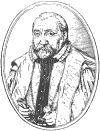Origin
The Lord's Supper Controversy
As mentioned in the previous section on reform in the Palatinate, Frederick III (1515-76) took over as Elector from his uncle, Otto Henry, who was childless. He took over this position in 1559, and no sooner did he begin and he had to deal with a heated controversy.
 The disagreement was over the doctrine of the Lord’s Supper. On one side of the dispute was Tilemann Heshusius. He was one of the professors at the University of Heidelberg, who also served as a preacher in the main church of Heidelberg, the Heiliggeistkirche. This man was a staunch defender of the Lutheran view of the Supper. This meant that he insisted that Christ was really and physically present when the sacrament was celebrated. On the other side was Wilhelm Klebitz. He was a student at the University and a deacon in the church. He promoted a more Reformed view of the Lord’s Supper. Klebitz maintained that believers have real, spiritual communion with Christ who is certainly spiritually, but not physically, present. The dispute between these two men became so bitter and so public that it was even addressed from the pulpit. At a certain point, Frederick III decided that, for the peace and well-being of the church, this clash between these two men had to stop. He acted decisively and dismissed both of them, sending them off to find another place to live.
The disagreement was over the doctrine of the Lord’s Supper. On one side of the dispute was Tilemann Heshusius. He was one of the professors at the University of Heidelberg, who also served as a preacher in the main church of Heidelberg, the Heiliggeistkirche. This man was a staunch defender of the Lutheran view of the Supper. This meant that he insisted that Christ was really and physically present when the sacrament was celebrated. On the other side was Wilhelm Klebitz. He was a student at the University and a deacon in the church. He promoted a more Reformed view of the Lord’s Supper. Klebitz maintained that believers have real, spiritual communion with Christ who is certainly spiritually, but not physically, present. The dispute between these two men became so bitter and so public that it was even addressed from the pulpit. At a certain point, Frederick III decided that, for the peace and well-being of the church, this clash between these two men had to stop. He acted decisively and dismissed both of them, sending them off to find another place to live.
 After Frederick III dismissed Heshusius and Klebitz, things settled down a little in Heidelberg. However, with Heshusius’ departure, two important positions had to be filled. The University needed a new professor of theology. And the church needed another preacher. The first man Frederick III recruited to fill these gaps was Caspar Olevianus. For a while he taught at the University, but soon he settled into his new role as the preacher in the Heiliggeistkirche. Shortly thereafter, Zacharius Ursinus also came to Heidelberg at Frederick III’s request. He is the one who took on the role of teaching theology at the University. The arrival of these two men set the stage for the writing of the Heidelberg Catechism, but it’s important to realize that the man who really set things in motion was not the preacher or the professor, but rather the Elector Frederick III himself. He saw the need for a new catechism, and he made sure that it happened.
After Frederick III dismissed Heshusius and Klebitz, things settled down a little in Heidelberg. However, with Heshusius’ departure, two important positions had to be filled. The University needed a new professor of theology. And the church needed another preacher. The first man Frederick III recruited to fill these gaps was Caspar Olevianus. For a while he taught at the University, but soon he settled into his new role as the preacher in the Heiliggeistkirche. Shortly thereafter, Zacharius Ursinus also came to Heidelberg at Frederick III’s request. He is the one who took on the role of teaching theology at the University. The arrival of these two men set the stage for the writing of the Heidelberg Catechism, but it’s important to realize that the man who really set things in motion was not the preacher or the professor, but rather the Elector Frederick III himself. He saw the need for a new catechism, and he made sure that it happened.
Elector Frederick III Commissions a New Catechism
 Once the Heidelberg Catechism was complete, Frederick III attached his own, personal preface to the document. This preface sheds some interesting light on why he was so keen on having a top-quality catechism for his territory. In this preface, the Elector highlights the following:
Once the Heidelberg Catechism was complete, Frederick III attached his own, personal preface to the document. This preface sheds some interesting light on why he was so keen on having a top-quality catechism for his territory. In this preface, the Elector highlights the following:
- Governing officials not only have the duty to maintain good order and peace in their territory, but “also and above all, constantly to admonish and lead them to devout knowledge and fear of the Almighty and His holy word of salvation.”
- Although his predecessors had planted seeds of reform in the Palatinate, these efforts never resulted in the bountiful spiritual harvest that many were hoping for.
- One key reason for the lacklustre results was that insufficient attention was paid to the youth who were either “careless in respect to Christian doctrine,” “entirely without Christian instruction,” “unsystematically taught,” or “perplexed with irrelevant and needless questions”—in many cases, it might have been all four.
Therefore, in order to address the aforementioned problem—which, to be sure, was not restricted to the youth—Elector Frederick III commissioned “the preparation of a summary course of instruction or catechism of our Christian Religion, according to the word of God.”
This new catechism was to be used both in “churches and schools” by “Pastors and Schoolmasters.” In this way there would be consistency in teaching, rather than teachers and preachers who “adopt daily changes, or introduce erroneous doctrine.”
Thus, with the youth of his city and the future of Christ’s church at heart, Elector Frederick III commissioned the writing of the Heidelberg Catechism. With it he expressed the hope “that if our youth in early life are earnestly instructed and educated in the Word of God, it will please Almighty God also to grant reformation of public and private morals, and temporal and eternal welfare.”
——————
Note: all quotations on this page are taken from the English translation of the original preface as found in Richards, G.W. The Heidelberg Catechism: Historical and Doctrinal Studies (Philadelphia, 1913), 182-99.






